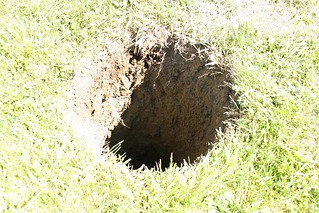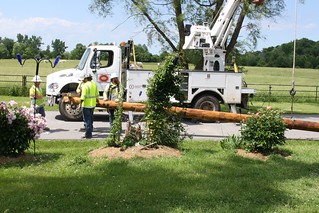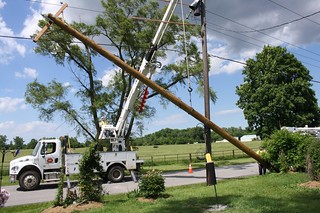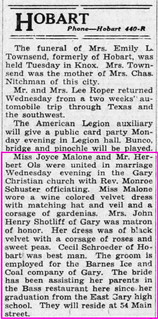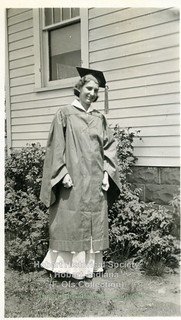
(Click on image to enlarge)
Crown Point Register, 11 Feb. 1875.
Unfortunately, I don't know which school the district numbers refer to, although I can make a guess based on who the teacher was.
The first teacher mentioned is Alfred A. Winslow. I don't remember ever encountering that name before. And yet, when I go searching for the family in the records, I find them here in Ross Township in the 1860 Census through the 1880 Census. But their farm lay on the western border of Ross Township …

(Click on image to enlarge)
From the 1874 Plat Map. The circle marks the nearest schoolhouse.
… so if I'd wanted to learn about the Winslows, I should have been reading Crown Point rather than Hobart newspapers.
And — what do you know — when I look for "Winslow" in the on-line Crown Point newspapers, one of the first things to come up is this interesting tidbit from the Crown Point Register of March 8, 1888:

(Click on image to enlarge)
It looks as if the whole family is fighting over their parents' estate, which was considerable. What I want to know is why our Alfred A. Winslow is among the plaintiffs while Mrs. Alfred Winslow (to whom he was still married) is among the defendants!
But let me back up a little and look at the family. The earliest local record I find of Alfred's father, William Augustus Winslow, is his 1853 marriage to Mary Cleveland in Lake County, Indiana. She was his second wife, but what became of the first[2] I do not know; presumably she died, and he was left with two small children (Henry and Lois). In 1854 Mary Cleveland Winslow brought our Alfred into the world. The 1860 Census finds the family farming in western Ross Township (to judge by their neighbors). By then another three children (Edgar, Helen, and John) had joined them, although, oddly enough, the daughter from the first marriage, Lois, was not in the household. At some point after 1860, William and Mary lost their little John, it seems. The 1870 Census shows the addition of three more children: George, Josephine, and Mary, who was also known as Minnie per the 1880 Census. Around 1873, they had a little girl, Flora Bell, who died at two years of age.
In December 1886, William Winslow died.

(Click on image to enlarge)
Crown Point Register, 16 Dec. 1886.
About ten months later, his widow followed him.

(Click on image to enlarge)
Crown Point Register, 6 Oct. 1887.
And the next spring, as we've seen, the children fought it out over the estate. In 1890, the old farm passed out of Winslow hands.
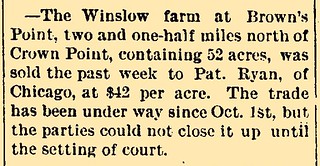
(Click on image to enlarge)
Crown Point Register, 5 Dec. 1890.
At 52 acres, it was half the size it had been in 1874.
Getting back to Alfred — I believe the school where he taught per the 1875 county superintendent's report was identified by Lenore Boyd Calpha as the one-room Brown's Point school. I believe that simply because it was the school closest school to Alfred's home (see the circle marking it on the 1874 map above).
The fact that the superintendent gave a good account of the teacher and students in spite of the school's lack of equipment and the poor physical condition hints that Alfred was a man of some ability. His subsequent career bore that out; witness this description from 1910:
Alfred A. Winslow … studied law for some time and taught school for ten years,[3] but gave up the profession of teaching for that of journalism, founding in 1881 the "Hammond Tribune," which he published for fifteen years. He assisted in organizing the meat-inspection forces of the Government at Chicago, Illinois, and Hammond, Indiana, having received an appointment as assistant inspector in the bureau of Animal Industry. Mr. Winslow was also for a short time city treasurer of Hammond, Indiana, and assisted in taking the Government Census of 1890. In 1989 he accepted the consulship at Liege, Belgium, from which post he was promoted in 1902 as Consul-General to Guatemala, and in 1906 was transferred to Valparaiso [Chile] as Consul.[4]From the same source comes this photo of Alfred:

(Click on image to enlarge)
After retiring from the international scene, Alfred moved back to Crown Point. His death in 1929 was splashed across the front page of the Crown Point Register and was mentioned in newspapers from Connecticut to California.

(Click on image to enlarge)
Lake County Times (Hammond, Ind.), 17 Aug. 1929.
He is buried in Maplewood Cemetery in Crown Point, beside his wife, who died in 1947.
As so often happens when I start on a story with more than one name in it, I originally meant to focus on the Ross Township schools and what the county superintendent thought of them, but then I went off on the Winslow tangent and spent so much time there that I will have to save for another time my discussion of how awful the rest of the schools were in 1875.
_______________
[1] I think the superintendent at that time was Thaddeus S. Fancher, a Crown Point attorney. See Timothy Horton Ball, Encyclopedia of Genealogy and Biography of Lake County, Indiana, with a Compendium of History 1834 – 1904 (Chicago: The Lewis Publishing Company, 1904), p. 363.
[2] Susan Decker, whom William married in 1844 in Ashtabula County, Ohio.
[3] I find some evidence in local papers that he left Ross Township and began teaching in Hammond schools soon after 1875.
[4] International Bureau of the American Republics, Bulletin of the International Bureau of the American Republics, Vol. XXX, Nos. 1-3, Jan.-Mar. 1910 (Washington: Government Printing Office, 1910).)



